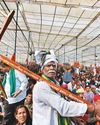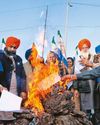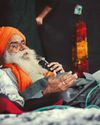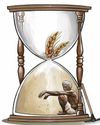
ON November 15, the 150th birth anniversary of Adivasi icon Birsa Munda, Union Home Minister Amit Shah renamed Delhi’s Sarai Kale Khan Chowk as Birsa Munda Chowk. According to BJP leaders, this is the first time in the history of independent India that an Adivasi leader’s name has been etched on the streets of the National Capital.
Coincidentally, thousands of miles away, just a day before—in a different time zone—a 22-year-old indigenous Member of Parliament from New Zealand, Hana-Rawhiti Maipi-Clarke, rocked social media by performing Haka on the floor of the House. Her protest through this traditional Maori dance form against a controversial bill that would allegedly curtail the rights of the indigenous people made it a spectacle.
As the protruding tongue, stomping feet and thumping claps sang paeans to the rights of the indigenous population in New Zealand, the dream of a Santhal or an Oraon flexing bow and arrow on the floor of the Indian Parliament remains a distant dream. What comes as an alternative is mere symbolism—the occasional nomination of an Adivasi as the President or the renaming of some chowks.
Coming a week before the results of the Assembly polls, the renaming of the Delhi chowk seems to have a broader political relevance. Jharkhand has 26 per cent Adivasi population. Since the formation of the state, Adivasis have played a formidable role in determining the fate of political parties. In 2019, when the Jharkhand Mukti Morcha-led coalition came to power, they won 25 out of the 28 reserved ST seats. In the 2024 Lok Sabha polls as well, the ruling alliance maintained its tally and won all the five ST-reserved Lok Sabha constituencies.
BJP on a Roller-Coaster Ride
This story is from the {{IssueName}} edition of {{MagazineName}}.
Start your 7-day Magzter GOLD free trial to access thousands of curated premium stories, and 9,000+ magazines and newspapers.
Already a subscriber ? Sign In
This story is from the {{IssueName}} edition of {{MagazineName}}.
Start your 7-day Magzter GOLD free trial to access thousands of curated premium stories, and 9,000+ magazines and newspapers.
Already a subscriber? Sign In

Between Life, Death and Protest
The strain of sustaining a long protest is evident among farmers at Khanauri, but the sense of community remains strong

Protest 2.0
Farmers still have hopes from their leaders, but time is running out. The enemies, in the meanwhile, are sharpening their weapons

Trajectory of Nowhere
In the context of space and time, who are we humans and do we even matter?

All of God's Men
THE ongoing Maha Kumbh at Prayagraj is a spectacle, a photo op, and an emotion and manifestation of the mixing of spirituality and faith.

Embers Rekindled
While the recent death by suicide of a farmer has rendered the mood sombre at Shambhu border, the protests have picked momentum at the call of the unions

Time for Course Correction
What the protest by Punjab's landed peasantry tells us about the state's economy and society

The Untouchable
The ideological chasm between Ambedkar's vision and the Hindutva worldview remains irreconcilable

Frontliners
A day in the life of women protesting at Shambhu border

The Farmer-Composing Antagonist
Farmer leader Jagjit Singh Dallewal has been on a fast-unto-death at Khanauri border to pressurise the government to fulfil its promises to the farming community

Till Death Do Us Part
Jagjit Singh Dallewal has reinforced how a fast unto death can serve as a warning and an appeal to the public and the government